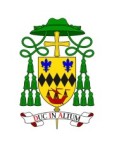Our Archdiocese
- Archbishop
- Bishop
- Vicar General & Episcopal Vicars
- Statistical Overview
- Boundaries of Archdiocese
- Organisational Structure
- Archdiocesan Assembly 2023-24
- Archdiocesan Plan 2016 - 2021
- History
- Coat of Arms
- Fifth Plenary Council of Australia
- Cathedral
- COVID-19 Position Statement
- Modern Slavery Statement
- Connect With Us

Twenty-Ninth Sunday of Ordinary Time (Year B)
Aboriginal Sunday Mass (Perth)
Homily
By the Most Rev Bishop Don Sproxton
Auxiliary Bishop of Perth
St Mary’s Cathedral, Perth
Sunday 20 October 2024
Download the full text in PDF
We arrived for the celebration of the Mass this afternoon and participated in an ancient ceremony: the Smoking ceremony. This has been an important ritual of welcome, purification and healing for tens of thousands of years in our land.
Once we commenced the Mass, water was blessed and sprinkled over the assembly. We know this rite’s significance. The water recalls the ritual of Baptism, which in the Christian community has the same meaning. Through Baptism we are welcomed and reborn, healed and brought into a new relationship with God by being made His sons and daughters, and brothers and sisters of each other in the faith.
There has been a lot of work done in recent years to understand the ancient rituals and symbols of the Aboriginal and Torres Strait peoples. This has led to the taking of some of them for use in our Christian celebrations, because of the common understandings and meaning they have and for what they communicate about our relationship with our Father, the people and the earth.
I am very pleased to be with you all at the Mass. We are a Catholic community brought together by our faith in Jesus Christ. We are brothers and sisters because of our faith.
The remarkable thing, in the story of the two disciples who asked for the special honour to be placed above their friends when all the disciples were with Jesus in heaven, is the teaching that Jesus gave to these first disciples about who is really the first in the Kingdom. It is not the powerful and the great but the lowest, the servant and slave of all who the Father will choose.
This is one of the stories that we pass on to the next generation, as we have ourselves have received from our elders who have gone before us. The stories carry messages to help us grow to be what we are called to be. They help us to understand why things are the way they are in the world, in our country. They help us to understand why we do the things we do and what can be the better way to go in our relationships with other people and the land. These stories are for us as much as they were for the first disciples.
Jesus teaches us. He teaches us to become servants, not dictators. But He does not use words alone to teach: He shows us how to be servants and He offers us the power or grace for us to have a change of heart.
Even more remarkably, Jesus continues to be our servant even after His triumphant over death and His resurrection. He serves us from His place of Glory by being with us and providing what we really need to grow as persons and as disciples.
We are called to imitate the model of servanthood of Jesus. This is the pathway to life that is full and meaningful. But we need to remember is this is life-long learning of loving, forgiving, reconciling and noticing the needs of others. Being a disciple is learning how to listen to the events in our lives and growing through reflecting on each of these.
We will be disciples – learners - throughout our entire lives.
